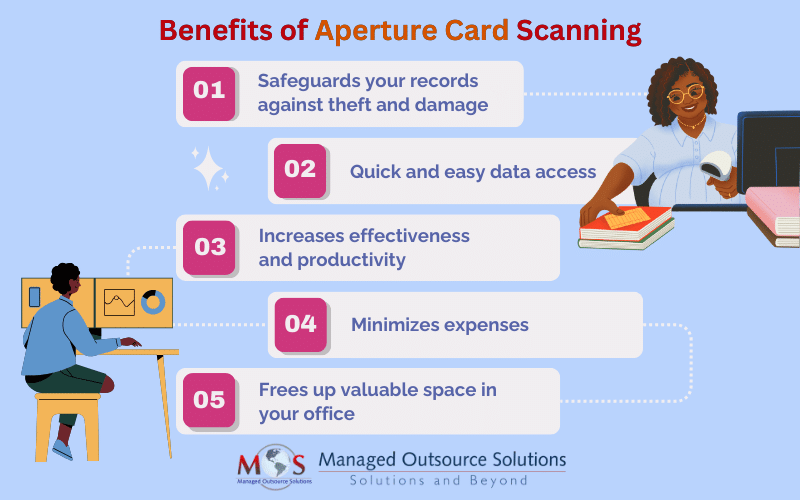Aperture cards were once among the best methods for preserving important documents, but they aren’t used much now. It is best to have these digitized and kept safe. It helps archive engineering drawings, blueprints, technical diagrams or plans and allows multiple copies of these documents to be produced for easy distribution. An aperture card is a punched card containing a small microfilm chip. Scanning aperture cards allows the information on these cards to be digitally preserved. This is a great way to save space and efficiently archive valuable data for easy retrieval and sharing. So, to accurately scan aperture cards, it is crucial to invest in reliable document scanning services.
Advantages of Aperture Card Scanning
Significance of Aperture Card Scanning
Aperture cards have been the standard for data storage in many industries for decades as they can be read, indexed, stored, and quickly retrieved by computers. In addition to providing a convenient way to view the document, aperture cards also offer easily readable indexing for quick retrieval, making them the perfect solution for drawings or specifications. Moreover, they can be transported and duplicated as single image units. Aperture cards were widely used by manufacturing companies, government organizations, and architectural and engineering firms to store media. However, these cards can deteriorate over time and become more challenging for equipment to read. Therefore, these aperture cards should be converted into their digital form to preserve the data.
If you have the right equipment, converting an aperture card to a digital file is a fairly easy process. The majority of document conversion businesses can assist you in making the switch from paper to digital versions of all your documents, including aperture cards. The handwritten data on the aperture cards will typically become the indexing data. Aperture cards are a long-lasting form of document storage, but only if you take good care of them. If you wait too long to convert your files, you run the risk of losing them.
Advantages of Scanning Aperture Cards for Businesses
- Safeguard your records against theft and damage: Aperture cards are prone to damage from heat, humidity, fire, and water. A few scratches could cause the information inside to be damaged and lost forever. You can rest easy knowing that digital backups are securely stored in a cloud-based document management system with the help of a good scanning solution.
- Quick and easy data access: It can be difficult to try to read the information on aperture cards. Due to cell corrosion, this information is frequently unreadable. However, when you digitize the data, you’ll be able to quickly search through each document to find the details you require. Your aperture cards will be accessible from virtually anywhere after being converted to digital format, giving your staff the information that they require wherever they are.
- Increases effectiveness and productivity: Your staff members are better able to complete their work on time when they can access the data on your aperture cards quickly and effectively. As they can participate more actively in their roles rather than wasting time looking for documents, it will also help to raise the morale of your staff.
- Minimize expenses: Aperture card readers can cost much more than is actually necessary in order to access a given document. You can avoid spending a lot of money on expensive capture equipment by outsourcing the digitization of your aperture cards. Once your records are digital, sharing and transferring them among employees throughout the company is simple.
- Make room in your office: Your aperture cards can be converted to digital format, freeing up space in the office that could be better utilized as extra desks or a training room.
Transform Your Aperture Cards into Digital Format with Managed Outsource Solutions.
Speak to our Solutions Manager Today!
The Process of Scanning Aperture Cards
Advanced aperture card scanning technology is used to capture the image of the aperture card during the scanning process, guaranteeing a high level of accuracy, clarity, and image scaling. In order to provide a true like-for-like representation of the original drawing, they make sure that every detail of the original drawing is captured in the digital image.
The aperture card scanning process involves identifying the metadata on each card, compiling the metadata into a separate database, scanning the cards, performing QC and delivery of final output. While aperture card scanning offers many benefits, it involves expenses. You would have to purchase special scanners, and train and deploy staff to perform the job.
After being scanned, aperture cards are digitally transformed into high-resolution digital images. The resulting digital images can be saved in many different formats, such as TIFF, PDF, and JPEG, and they can be indexed and cataloged in accordance with the client’s requirements. This makes the images accessible and guarantees their organization and searchability.
Are Aperture Cards good or bad?
To learn more
read our blog post Pros and Cons of Aperture Cards
Whether your aperture card contains blueprints for a building, academic records, personnel files, or drawings, aperture card scanning services will guard your important data from being lost or damaged. A good document scanning service provider can help with efficient digitization of aperture cards.





